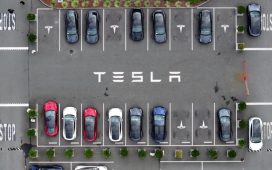Some of Rocket Auto’s vehicle inventory will come from its Vroom partnership, which dates to 2017. Gilbert was an early investor in the platform.
In May 2020, Vroom agreed to list its inventory on the Rocket Auto site, according to a government filing. Although the inventory will be listed on the Rocket Auto platform, all sales of Vroom inventory will be conducted through the Vroom platform. As part of the agreement, “Rocket will ensure that not less than a minimum percentage of all used vehicles sold or leased through the platform on a monthly basis will be Vroom inventory,” the filing said.
Additionally, Vroom agreed to pay Rocket a combination of cash and stock for vehicle sales made through the platform. This included 183,870 shares of common stock issued with the agreement and the potential for a total of 8,641,914 shares of common stock over a four-year period based on sales volume of Vroom inventory through the Rocket Auto platform. Based on Vroom’s stock price Thursday of about $43.70, that initial stock investment was worth about $8 million and could potentially be worth about $377.7 million in total stock rewards.
Vroom was asked whether its relationship with Rocket Auto would change in light of the AutoFi partnership announcement.
“As a partner of Rocket Auto, Vroom is excited to be part of this initiative as both companies seek to collaboratively advance online auto retailing,” a Vroom spokesman said in an emailed statement.
Vroom plans to report first-quarter earnings next Wednesday.
Rocket Auto facilitated the sale of 13,600 vehicles in the first quarter, up more than 5,300 vehicles — or 65 percent — from the same time last year. That represents $360 million in vehicle sales and an annualized run rate over $1 billion.
The company originated $103.5 billion in closed mortgage loans in the first quarter and posted net income of $2.77 billion.
Rocket Auto’s current sales aren’t coming from existing mortgage customers, Farner said, as the company wanted to test the business’ success on its own merits.
“We wanted to construct a business that had all of the appropriate profitability metrics before really leaning in to our client base,” Farner said.
Still, the company has “just started scratching the surface” of the offerings its Rocket platform can present to consumers, Farner said.
“We should be able to look out at every American and target market or have a specific message and value about how we can help them improve on their home, saving money in some way, shape or form, buy a car or help them with a real estate transaction,” Farner said. “When you put those things together, that’s 30 percent of the U.S. GDP that we’re talking about here. All surrounded in a multibillion-dollar brand.”
David Muller contributed to this report.







